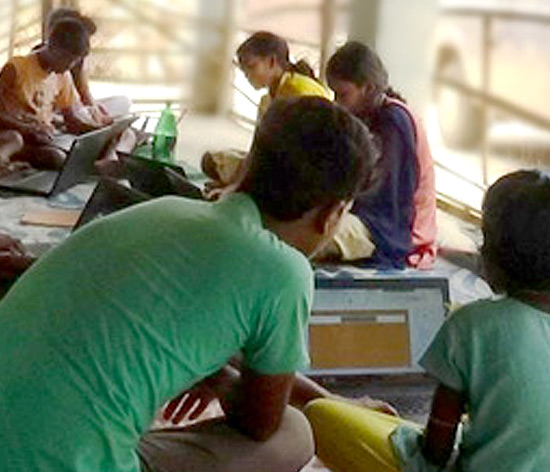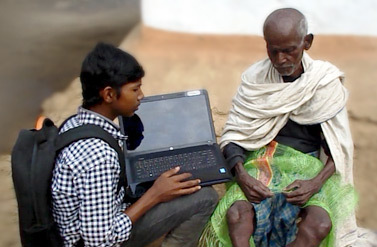
Suchana, a community society from Uttar Chandipur, West Bengal, focuses on building supplementary education practices that are responsive to the experiences and culture of Adivasi children. Under the aegis of Tata Trusts projects, Suchana saw important new developments this year. Tata Trusts' projects helped expand Suchana's reach into remote Adivasi villages, develop innovative practices to promote gender equality and local project ownership, and evolve methods for exchange-based training and learning.
Suchana began mobile implementation of Trusts' Integrated Technology in Education (ITE) project in two new centres in April and May 2014. Tata Trusts' ITE outreach reaches out to 223 students through two external centres (including Suchana). Suchana's 'mobile' package included 15 charged laptops, 10 mats, 10 rechargeable lanterns and 5 whiteboards. Five teachers and a computer facilitator load the package into a vehicle, drive out to the centres and conduct curriculum-based supplementary education classes six days a week. The mobile package enables them to provide students with quality, child-centred learning closer to the homes of marginalised communities. Consequently, children from Santal and Kora tribal communities are now able to access and use technology for connected, interactive learning of school subjects.
The 'Mobile ITE' project, as well as Suchana's other mobile projects, required drivers to drive the van carrying laptops and other teaching-learning materials. Instead of employing professional drivers, Suchana decided to train teachers to drive, thus putting them in control of the project. The organisation also turned this into an opportunity to promote gender equality by putting particular emphasis on training women teachers to drive. This has produced the very first Adivasi and scheduled caste women drivers in the region. A basic car repair workshop was organised to teach the newly trained drivers how to attend to basic mechanical problems that crop up when driving. Women drivers were encouraged to take it up as a learning opportunity. This not only helped enhance their confidence and skills but also provided spirited role models for girls in the rural communities.
As an extension of ITE, students were given an opportunity to take their newly learned technological skills to their villages, to make a project of use or interest to their wider communities. Supported by teacher facilitators; students collected data, conducted interviews, and made presentations and movies about their communities, documenting tribal folklore and history unique to their tribal communities using their 'first' languages (Santali, Kora and Bangla). The topics chosen ranged from the use of herbal medicines, the changing course of the river in a Kora village, comparison of pond usage in different villages, perspectives on 'the past and the present', and the changes brought about by development in recent years. These projects are being prepared for upload on the internet, and are likely to be the first artefacts of self-representation in Santali and Kora languages on the web by young people.

Suchana has also evolved methods for training and learning that use direct observation, hands-on opportunities and an exchange-based approach.
The exchange approach is based on the philosophy that each organisation has special skills and experiences to share, and that learning is enhanced when it builds on these skills and experience. Exposure visits are arranged to Trusts' partners and other organisations, which are aimed at sharing best practices and supporting organisations to evolve and experiment with new approaches. Visiting organisations have the opportunity to select from skill and theme-based learning components to build a tailored learning package.
About 950 children attending Suchana's mobile library access animated stories and literacy material in their first language — Santali. Suchana's teachers have also trained 120 students and 15 teachers of Jadavpur Uccho Vidyalaya, a local government high school, in basic computer literacy, as a precursor to the implementation of the ITE programme.
Since 2012 Tata Trusts, with the support of its 12 partners, have reached out to around 10,000 children through its ITE projects.
